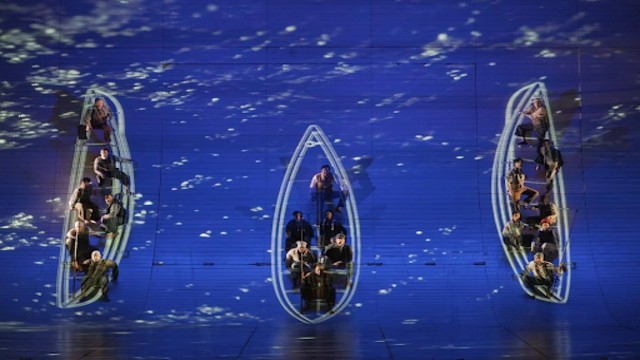
This image released by the Metropolitan Opera shows a scene from a rehearsal of the opera "Moby-Dick" at the Metropolitan Opera on Feb. 20, 2025 in New York. (Karen Almond/Met Opera via AP)
When Leonard Foglia was asked to direct an opera based on Moby-Dick, his initial excitement quickly turned into apprehension. "That’s great!" he recalled thinking, only to rush to a bookstore, flip through the massive novel, and realize, What have I gotten myself into?
The challenge was monumental—transforming Herman Melville’s 600-page classic into an opera that would resonate with audiences. But through collaboration and creativity, Foglia and his team made it happen. Their production will soon grace the stage at the Metropolitan Opera, with performances starting March 3.
From Novel to Libretto
Composer Jake Heggie and librettist Gene Scheer faced the formidable task of distilling the novel into a 64-page libretto. Scheer retained as much of Melville’s language as possible, estimating that nearly half of his text comes directly from the book—though often adapted to suit the opera’s rhythm and flow.
One major change was setting the entire story aboard the Pequod, removing the early land-based chapters. Another was renaming the narrator "Greenhorn," reflecting his inexperience at sea. The novel’s iconic first line, “Call me Ishmael,” now appears at the opera’s end, signifying the character’s transformation.
"In the book, Ishmael reflects on past events," Scheer explained. "But in theater, we need to see those events unfold in real time. By the end, he’s ready to write his story."
A Cast of Powerful Performers
Tenor Stephen Costello reprises his role as Greenhorn, a character who undergoes the opera’s most profound transformation. "He has no purpose on land, so he boards the Pequod," Costello said. "He’s either going to die at sea or discover who he truly is."
Joining him is tenor Brandon Jovanovich as the vengeful Captain Ahab. Soprano Janai Brugger portrays Pip, Ahab’s cabin boy, in a traditional "trouser role." Baritone Peter Mattei takes on the role of Starbuck, while bass-baritone Ryan Speedo Green plays Queequeg. The production, conducted by Karen Kamensek, will run through March 29.
A Theatrical Triumph
Originally commissioned to celebrate the opening of a new opera house in Dallas, Moby-Dick has captivated audiences and critics alike. Even scholars admire its adaptation.
Bob Wallace, a professor and past president of the Melville Society, was so impressed that he wrote a book about its creation. "Heggie and Scheer brilliantly condensed the novel while preserving its essence," he noted.
Critics have praised not only the storytelling and the opera’s gripping score but also its visually stunning production. With set designs by Robert Brill and projections by Elaine J. McCarthy, the show’s multimedia-enhanced staging has been described as "striking to near-miraculous."
A Visual Spectacle
One of the production’s most breathtaking moments involves the illusion of crew members rowing away from the Pequod in whaling boats, achieved through animated projections on a curved climbing wall.
Director Foglia and his team pushed the boundaries of what opera singers typically endure. In one intense scene, Pip dangles high above the stage, appearing to tread water while performing a challenging aria.
"I told Janai during rehearsal, ‘You’re going to hate me for this,’" Foglia joked. "She has to sing one of her hardest pieces while suspended by a single wire."
Greenhorn and Queequeg climb towering ladders to perform atop the ship’s mast. Meanwhile, Ahab, missing a leg from his past encounter with the white whale, moves on a wooden prosthesis. The opera concludes dramatically as Greenhorn, now Ishmael, clings to a whale hook from a passing ship, lifting him to safety.
"I joke with the singers that the one thing opera performers rely on—having both feet on the ground—I’ve taken away from them," Foglia said with a grin.
With its gripping storytelling, powerful music, and jaw-dropping visuals, Moby-Dick at the Met promises to be an unforgettable experience.















